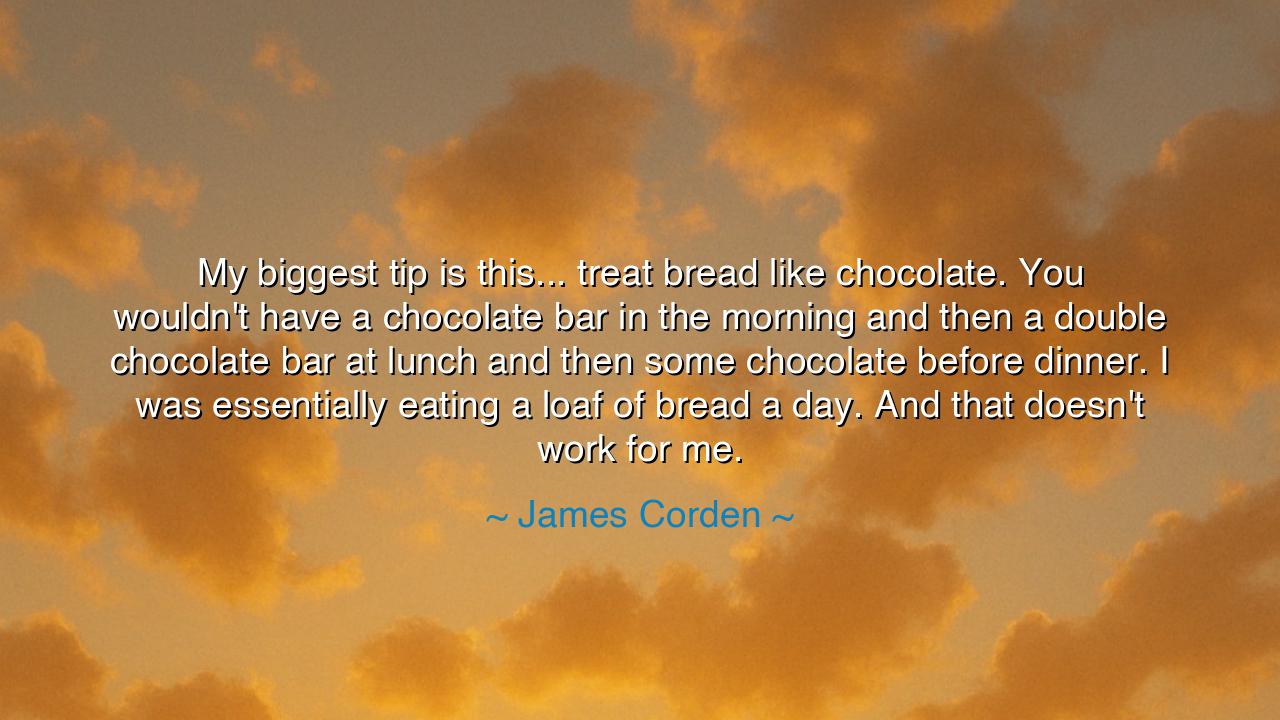
My biggest tip is this... treat bread like chocolate. You
My biggest tip is this... treat bread like chocolate. You wouldn't have a chocolate bar in the morning and then a double chocolate bar at lunch and then some chocolate before dinner. I was essentially eating a loaf of bread a day. And that doesn't work for me.






"My biggest tip is this... treat bread like chocolate. You wouldn't have a chocolate bar in the morning and then a double chocolate bar at lunch and then some chocolate before dinner. I was essentially eating a loaf of bread a day. And that doesn't work for me." Thus spoke James Corden, with honesty born of struggle, sharing a lesson forged in his own body and spirit. His words are not merely about bread and chocolate—they are about excess, discipline, and the courage to confront the habits that weigh us down.
Bread, that ancient gift of the earth, has been for millennia the symbol of life itself. To “break bread” is to share fellowship; to pray for “daily bread” is to ask for sustenance. Yet even the noblest gift, taken without measure, becomes a chain. In likening bread to chocolate, Corden awakens us to the truth that overindulgence, even in what is common and familiar, is no less dangerous than the obvious sweetness of indulgence. Too much of a good thing becomes the thief of balance.
The confession of a loaf a day is striking. It is the image of a man who, though nourished, was burdened, weighed down by the very food meant to sustain him. And here lies the deeper meaning: when habits grow unchecked, they do not merely feed us—they consume us. To face this truth, to admit it openly, is an act of courage, for many would rather remain blind to the quiet tyranny of their appetites.
History bears witness to this lesson. Consider the Romans, who in their decadence feasted without restraint, until the glory of their empire sagged beneath the weight of gluttony and excess. Or recall Buddha, who as a prince once indulged in luxury, but discovered that such abundance led only to dissatisfaction. His great awakening came when he realized that neither extreme deprivation nor unchecked indulgence brought freedom—only balance did. Corden’s words, in their modern way, echo this same ancient truth.
Yet there is no bitterness in his teaching. Instead, there is a gentle wisdom, almost playful: treat bread like chocolate. Not to deny it, not to exile it from life, but to honor it by giving it its rightful place. To savor it as a gift, not to drown in it as a master. This is not the law of abstinence, but of moderation—the law that allows both health and joy to coexist.
The lesson is clear: be mindful of what you consume, not only in food, but in all of life. Bread, chocolate, work, leisure, even love—when taken in excess, they overwhelm rather than uplift. When enjoyed with discipline and gratitude, they enrich the soul. The secret lies not in denial but in balance, not in endless taking but in conscious savoring.
Practical action must follow. Look upon your own life and ask: what is my “loaf of bread a day”? What do I consume too much of, mistaking quantity for satisfaction? It may be food, or it may be distraction, entertainment, or even worry. Whatever it is, learn to treat it as Corden advises: not as an endless feast, but as a rare sweetness, treasured in its time and place.
Thus James Corden, with humor and humility, speaks a truth that echoes through the ages. “Treat bread like chocolate.” Behind these simple words lies a teaching as old as humanity: the path to health, peace, and fulfillment is not found in endless indulgence, but in mindful restraint, in the ability to honor life’s gifts without becoming their slave.






AAdministratorAdministrator
Welcome, honored guests. Please leave a comment, we will respond soon